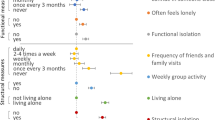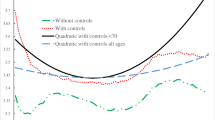Abstract
Social support is increasingly acknowledged as an important resource for promoting well-being. We test whether social support changes around retirement. We also examine whether social support moderates dynamics in mental well-being around retirement and consider both own and spouse’s retirement drawing on a unique longitudinal, couple-level data set from Australia. We observe descriptively no effect of own or spouse’s retirement on social support. However, those with high social support do experience a small but statistically significant improvement in mental well-being post retirement. Using pension eligibility as an instrument, we find that own retirement causally improves mental well-being for women and by a similar degree for those with low/high social support. We also estimate responses to life satisfaction and find evidence that spill-over benefits from spousal retirement are larger for individuals with low social support.





Similar content being viewed by others
Notes
We include the small number of older same-sex couples (< 0.002% of observations in our analysis sample).
Retirement status is not specifically asked about in 2003, 2004, 2007 and 2011.
Since mental wellbeing and social support are likely to be correlated, we examined the extent to which these variables capture independent resources. In our estimation sample, the pooled correlation is moderate (0.44). However, the within correlation is relatively low (0.19), indicating substantial independent time-varying variation.
Our IV approach requires that we include non-retirees to estimate the first stage. However, we do not know whether non-retirees will retire in the future, which introduces non-random measurement error in the anticipation indicators (our lag retirement terms suffer from the same issue for retirees we do not observe entering retirement). Further, we would require as many instruments as event-time indicators; in preliminary work we found that lags and leads of the eligibility indicator were sometimes weak instruments for the event-time indicators. This would have made the coefficients difficult to interpret within an event study framework.
For people who retire more than once, we use their first observed retirement as the event date.
We remain agnostic about the employment state before retirement, which means that differences by subgroup (i.e. sex, social support level) may reflect heterogeneity by transition state. However, this does not seem to be the case. In Appendix Table 9 we report the proportions of people in each employment state in the year before retirement. Across all our subgroups, most people (at least 51%) transition from a state of employment. Moreover, our event study figures are similar if we restrict the sample to those transitioning from employment Figures 6, 7, 8, 9.
For completeness, we also repeated our event study analysis using life satisfaction as the dependent variable and report figures in Appendix B Figures 10, 11. The results show life satisfaction improving over the transition for own retirement, particularly for high support men and low support women. Responses to spouse’s retirement are positive in the short-term, particularly for high support types. The magnitudes of these effects are much smaller than the IV estimates.
References
Atalay, K., Barrett, G.F.: The causal effect of retirement on health: New evidence from Australian pension reform. Econ. Lett. 125, 392–395 (2014)
Atalay, K., Barrett, G.F.: The impact of age pension eligibility age on retirement and program dependence: Evidence from an Australian experiment. Rev. Econ. Stat. 97(1), 71–87 (2015)
Atalay, K., Zhu, R.: The effect of a wife’s retirement on her husband’s mental health. Appl. Econ. 50(43), 4606–4616 (2018)
Atalay, K., Barrett, G.F., Staneva, A.: The effect of retirement on elderly cognitive functioning. J. Health Econ. 66, 37–53 (2019)
Atalay, K., Barrett, G.F., Staneva, A.: The effect of retirement on home production: evidence from Australia. Rev. Econ. Household 18, 117–139 (2020)
Berry, H.L., Welsh, J.A.: Social capital and health in Australia: An overview from the household, income and labour dynamics in Australia survey. Soc. Sci. Med. 70, 588–596 (2010)
Bertoni, M., Brunello, G.: Pappa Ante Portas: The effect of the husband’s retirement on the wife’s mental health in Japan. Soc. Sci. Med. 175, 135–142 (2017)
Dave, D., Rashad, I., Spasojevic, J.: The effects of retirement on physical and mental health outcomes. South. Econ. J. 75, 497–523 (2008)
d’Hombres, B., Rocco, L., Suhrcke, M., McKee, M.: Does social capital determine health?. Evidence from eight transition countries. Health Econ. 19, 56–74 (2010)
Eibich, P.: Understanding the effect of retirement on health: Mechanisms and heterogeneity. J. Health Econ. 43, 1–12 (2015)
Fé, E., Hollingsworth, B.: Short- and long-run estimates of the local effects of retirement on health. Journal of the Royal Statistical Society: A 179, 1051–1067 (2016)
Fletcher, J.: Late life transitions and social networks: The case of retirement. Econ. Lett. 125, 459–462 (2014)
Flood, M. (2005). Mapping Loneliness in Australia. The Australia Institute, Discussion Paper No. 76.
Frijters, P., Clark, A. E., Krekel, C. & Layard, R. (2020). A happy choice: wellbeing as the goal of government, Behavioural Public Policy, Forthcoming.
Gannon, B., Roberts, J.: Social capital: exploring the theory and empirical divide. Empirical Economics 58, 899–919 (2020)
Gorry, A., Gorry, D., Slavov, S.: Does retirement improve health and life satisfaction? Health Econ. 27, 2067–2086 (2018)
Ho, C.Y.: Better health with more friends: The role of social capital in producing health. Health Econ. 25, 91–100 (2016)
Jokela, M., Ferrie, J., Gimeno, D., Kivimaki, M.: From midlife to early old age: Health trajectories associated with retirement. Epidemiology 21(3), 284–290 (2010)
Kettlewell, N., Morris, R. W., Ho, N., Cobb-Clark, D., Cripps, S. & Glozier, N. (2020). The differential impact of major life events on cognitive and affective wellbeing. SSM – Population Health, 10, 100533.
Lancee, N., Radl, J.: Social connectedness and the transition from work to retirement. Journal of Gerontology: Social Sciences 67(4), 481–490 (2012)
Leinonen, T., Lahelma, E., Martikainen, P.: Trajectories of antidepressant medication before and after retirement: the contribution of socio-demographic factors. Psychiatric Epidemiology 28, 417–426 (2013)
Manty, M., Kouvonen, A., Lallukka, O, Rahkonen: Changes in physical and mental health functioning during retirement transition: a register-linkage follow-up study. The European Journal of Public Health 28(5), 805–809 (2018)
Mein, G., Martikainen, P., Hemingway, H., Stansfeld, S., Marmot, M.: Is retirement good or bad for mental and physical health functioning? Whitehall II longitudinal study of civil servants. J. Epidemiol. Community Health 57, 46–49 (2003)
Milner, A., Krnjacki, L., Butterworth, P., LaMontagne, A.D.: The role of social support in protecting mental health when employed and unemployed: A longitudinal fixed-effects analysis using 12 annual waves of the HILDA cohort. Soc. Sci. Med. 153, 20–26 (2016)
Nielsen, N.F.: Sick of retirement? J. Health Econ. 65, 133–152 (2019)
Nguyen, H. T., Mitou, F., Taylor, C. L. & Zubrick, S. R. Does retirement lead to life satisfaction? Causal evidence from fixed effects instrumental variable models. Life Course Centre Working Paper No. 2020–10. (2020)
Oksanen, T., Vahtera, J., Westerlund, H., Kivimaki, M.: Is retirement beneficial for mental health? Antidepressant use before and after retirement. Epidemiology 22(4), 553–559 (2011)
Picchio, M. & van Ours, J. C. (2019). The Mental Health Effects of Retirement. IZA Discussion Papers 12791, Institute of Labor Economics (IZA).
Ronconi, L., Brown, T.T., Scheffler, R.M.: Social capital and self-rated health in Argentina. Health Econ. 21, 201–208 (2012)
Sabbath, E.L., Lubben, J., Goldberg, M., Zins, M., Berkman, L.: Social engagement across the retirement transition among ‘young-old’ adults in the French GAZEL cohort. Eur. J. Ageing 12, 311–320 (2015)
van den Bogaard, L., Henkens, K., Kalmijn, M.: So now what? Effects of retirement on civic engagement. Ageing Soc. 34(7), 1170–1192 (2014)
Vo, K., Forder, P., Tavener, M., Byles, J.: Retirement, age, gender and mental health: findings from the 45 and Up Study. Aging Ment. Health 19(7), 647–657 (2015)
Wang, Y., Matz-Costa, C.: Gender differences in the effect of social resources and social status on the retirement satisfaction and health of retirees. J. Gerontol. Soc. Work 62, 86–107 (2019)
Ware J. E., Kosinski, M., Dewey, J. E., & Gandek, B. (2000). SF-36 Health Survey : Manual and Interpretation Guide. Lincoln, RI : Quality Metric.
Westerlund, H., Kivimaki, M., Singh-Manoux, A., Vahtera, J.: Self-rated health before and after retirement in France (GAZEL): a cohort study. The Lancet 374(9705), 1889–1896 (2009)
Zhu, R.: Retirement and its consequences for women’s health in Australia. Soc. Sci. Med. 163, 117–125 (2016)
Funding
This research was partially supported by the Australian Research Council Centre of Excellence for Children and Families over the Life Course (project number CE140100027) and by an Australian Research Council Discovery Early Career Researcher Award (project number DE210100582). The Centre is administered by the Institute for Social Science Research at The University of Queensland, with nodes at The University of Western Australia, The University of Melbourne, and The University of Sydney. This paper uses unit record data from the Household, Income and Labour Dynamics in Australia (HILDA) Survey. The HILDA Project was initiated and is funded by the Australian Government Department of Social Services (DSS) and is managed by the Melbourne Institute of Applied Economic and Social Research (Melbourne Institute). The findings and views reported in this paper, however, are those of the author and should not be attributed to either DSS or the Melbourne Institute. Equal authorship; authorship order listed alphabetically. Corresponding author: Nathan Kettlewell.
Author information
Authors and Affiliations
Corresponding author
Additional information
Publisher's Note
Springer Nature remains neutral with regard to jurisdictional claims in published maps and institutional affiliations.
Appendices
Appendix
Appendix A—Main result Tables
Appendix B—Additional events study results
See Figs. 6,7, 8, 9, 10, 11,12
Appendix C—Additional IV Estimates
Rights and permissions
About this article
Cite this article
Kettlewell, N., Lam, J. Retirement, social support and mental well-being: a couple-level analysis. Eur J Health Econ 23, 511–535 (2022). https://doi.org/10.1007/s10198-021-01374-1
Received:
Accepted:
Published:
Issue Date:
DOI: https://doi.org/10.1007/s10198-021-01374-1











